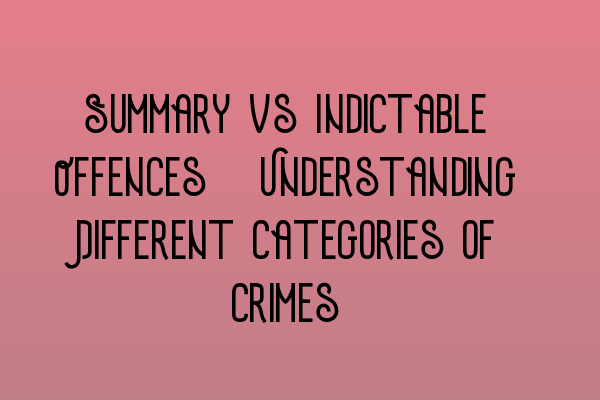Summary vs Indictable Offences: Understanding Different Categories of Crimes
When it comes to criminal law in the United Kingdom, there are various categories of offences that individuals can be charged with. One important distinction to be mindful of is the difference between summary offences and indictable offences. Understanding these categories is crucial, as it affects how the legal process unfolds and the potential consequences a person may face if found guilty.
Summary Offences: A Closer Look
Summary offences are generally considered less serious offences that are tried in the Magistrates’ Court. These cases are usually heard and decided by a single magistrate or a panel of magistrates, without a jury. Some common examples of summary offences include minor theft, public disorder offences, low-level assault, and driving offenses such as speeding or driving without insurance.
The key feature of summary offences is that they are subject to a relatively lower level of punishment compared to indictable offences. If found guilty, individuals convicted of summary offences may face a maximum prison sentence of up to 6 months or a fine of up to £5,000, depending on the severity of the offence. However, it is worth noting that there are some summary offences that have unlimited fines as a maximum penalty.
Indictable Offences: A Deeper Dive
Indictable offences, on the other hand, are more serious crimes that must be heard in the Crown Court. These offences are usually tried before a judge and jury, where there is a higher level of scrutiny placed on evidence, legal arguments, and the potential punishments for the accused.
Indictable offences encompass a wide range of crimes, including burglary, robbery, rape, murder, and drug trafficking, among others. These offences are often complex and require more resources and time to investigate and prosecute. Due to their serious nature, indictable offences carry more severe penalties than summary offences. If found guilty, an individual convicted of an indictable offence may face a longer prison sentence, ranging from a few years to even life imprisonment, depending on the specific offence.
Certain indictable offences called “either way” offences provide the flexibility for the Crown Prosecution Service (CPS) to choose whether to try the case in either the Magistrates’ Court or the Crown Court. Factors such as the seriousness of the offence and any aggravating or mitigating factors are considered when determining the appropriate venue for the trial.
Summary vs Indictable: Key Differences
To summarize the key differences between summary and indictable offences:
1. Venue: Summary offences are tried in the Magistrates’ Court, while indictable offences are heard in the Crown Court. “Either way” offences may be tried in either court.
2. Trial Process: Summary offences are usually tried by a single magistrate or a panel of magistrates, without a jury. Indictable offences are tried before a judge and jury.
3. Punishments: Summary offences may result in a maximum prison sentence of up to 6 months or a fine of up to £5,000. Indictable offences carry more severe penalties, including longer prison sentences, potentially ranging from a few years to life imprisonment.
4. Complexity: Indictable offences tend to be more complex and require more resources and time to investigate and prosecute compared to summary offences.
5. Severity: Indictable offences encompass more serious crimes such as burglary, robbery, rape, and murder, while summary offences include relatively minor offences like low-level assault or driving offenses.
Conclusion
Understanding the difference between summary and indictable offences is essential for anyone involved in criminal law in the UK. Whether you are a legal professional or an individual charged with a crime, knowing which category your offence falls into can help you understand the legal process and potential consequences more accurately.
If you find yourself facing criminal charges, seeking legal advice from a qualified solicitor is crucial. They can guide you through the complex legal system, help build a strong defense, and protect your rights. Remember, the information provided in this article is only a general overview and should not be considered legal advice.
At SQE Criminal Law & Practice Law UK, we are dedicated to providing expert legal counsel and representation. Contact us today to schedule a consultation with one of our experienced criminal law solicitors. Together, we will navigate the intricacies of your case and strive for the best possible outcome.
